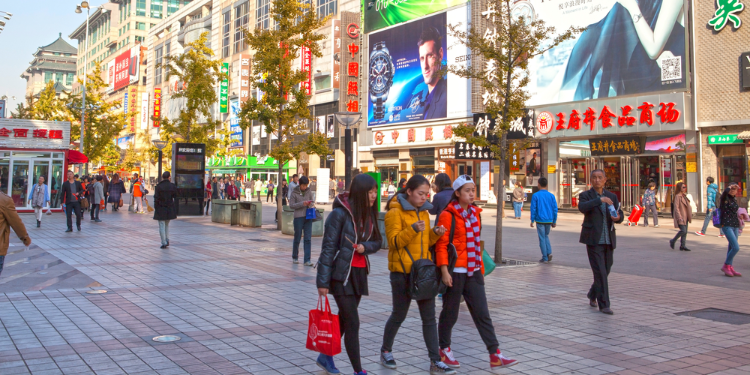
Fear has arisen just a few days before the opening of the Beijing Olympic Games. Covid has managed to filter through the "sanitary bubble". This means more tests, more control, and more restrictions for locals and expatriates. Borders remain closed, affecting international exchanges, whether commercial or educational. More and more foreigners seem keen to leave. Is mainland China about to experience an expat exodus too?
Worries and disappointment
"We try to wake up every day and tell ourselves it's going to be okay. But in the end, all this affects us enormously. The most painful part for me is that I haven't seen my child yet”, Thony told Sébastien Berriot, a reporter for Franceinfo. Thony, a 27-year-old Congolese expatriate, is the head of a trading company in Wuhan and has six employees. While his business is going very well, the pandemic has changed everything regarding his personal life. Thony has never seen his son, born in Congo in the middle of the crisis. China's zero Covid policy weighs heavily on the morale of the inhabitants. For expatriates, departure has become a complex issue. Is it possible to return to China? "Yes, but with complications," says Yann, another expat. He has come a long way. Repatriated to France at the start of the health crisis, the fifty-year-old expat left a prosperous business in Wuhan. He used to be a hairstylist with a mainly French clientele. It took him two years to get his visa back. But on his arrival in China a few weeks ago, Yann was confronted with another ordeal. His barbershop no longer exists, and his French clientele is gone. He currently has no income, and he has to start all over again. “Foreign customers have dropped by a whopping 70%. So now we're going to switch to the other side. I have to achieve at least 70% Chinese customers and 30% foreign customers". The inhabitants of Wuhan, locals and foreigners, are particularly marked by the pandemic. Despite the new normal, it is difficult to completely turn the page.
International students are equally impacted by China's zero Covid policy. Park Kyung-Su, a 22-year-old Korean, was supposed to study at Zhejiang University (eastern province of China). Back in South Korea for the winter holidays in December 2019, she had no idea that she would have to switch to remote learning. Park Kyung-Su only spent one semester in China. But she managed to return to her university in November 2021 and testified to the South China Morning Post: "I decided to go back to university because I realised that moving abroad is what makes university life so interesting after all. When I spoke to my friends who were already in Hangzhou, they told me that everything was back to normal, at least, in the sense of “living with Covid-19”. So I decided to go back". Still, Park is lucky since China signed an agreement with South Korea in July 2020, allowing Korean students to return to China. Despite the agreement, going back is sometimes complicated for them. "The university told us that since many Chinese students from all over the country had returned to campus, it would be better for international students to come later after they made sure everything was sorted out," says Park Seon-Yeong, another South Korean student.
Tom, an American expat, had just landed his dream job in China and moved with his family. Shortly after, the pandemic broke out, and Tom returned to the United States with his family. When the borders closed, he was stranded in the United States. But Tom finally obtained an entry permit with the help of the local authorities of the Chinese city in which his company is located. However, his family is not allowed to come back. So Tom spends a few months waiting for them in China. "I was thinking that everything would be okay, let's just try one more month', but eventually, it all fell apart. I am so depressed. My family is depressed too. We just want to see each other, "said Tom to the American media NPR. In the end, Tom moved to Thailand, where he reunited with his family after more than a year of separation.
How the "zero Covid" policy has affected expat life in China
In November 2021, during the celebration of the "New Era" of the Chinese Communist Party (CCP, founded in 1921), Xi Jinping pointed out that China mastered the situation better than any other country where the Delta variant is breaking records. The rise in GDP, +8.1%, could almost prove him right. However, this figure actually catches up with the sharp slowdown of 2020 (+2.3%) that continued in 2021. According to Ker Gibbs and Alan Beebe, presidents of the American Chambers of Commerce in Shanghai and Beijing, "the zero Covid policy is hurting international trade and driving expatriates away. "China has developed rapidly thanks to the hard work and entrepreneurship of the Chinese people, but openness to the world has also played an important role," Gibbs analyses in an article published in the Financial Times. “Getting leaders – and their families – in and out of China has been extremely difficult since the pandemic. Other experts talk about an expat exodus with the drop in the number of international students and the threat to current and future trade. According to the Shanghai-based American Chamber of Commerce, 53.4% of companies say that anti-Covid restrictions make them less attractive to international talent. 45.1% added that the current situation had a negative impact on their activities.
For Gloria Luo, the health crisis and restrictions are driving customers away. A senior sales manager for an auto parts and industrial mould maker in Guangdong, she has to contend with rising raw material costs. “Raw material prices and automotive mould logistics costs have skyrocketed. And this absorbs most of the profits", she says. Added to this are the deleterious relations with Western countries, especially the United States. "It looks like Chinese auto moulding companies suddenly lost all their competitiveness in 2021. A lot of European and American customers are now looking to South Korea or Europe", Gloria Luo said to the SCMP newspaper. According to her, there are only 4,000 auto moulding companies left, down from 9,000 in 2019.
For Kibbs, “It is clear that the expatriate population is shrinking day by day". He explains to Stéphane Lagarde, journalist Radio France International (RFI): “We have to consider two things. First, for more than 18 months, it has been complicated for expatriate families to return to China. Covid is therefore having a major impact on the lives of expatriates here. But the decline started before the epidemic in reality, and the question is whether the Chinese government is really interested in having expatriates in China". Can China do without expats? To answer this question, it's worth considering the determination with which the government is maintaining its health restrictions. Many believe that China is following the Singaporean model: gradually replacing international talent with Chinese talent. In March 2021, Josephine Tao, then Minister of Employment in Singapore, urged companies to favour the local workforce. Reserving executive positions for the Chinese people could be a new way for the Chinese government to maintain its hold.
Do expats have any future in China?
Putting the challenges aside, the government lays emphasis on the "good expatriates" who are well integrated into the Chinese population. Ismail Daurov, who is one of them, was interviewed by the news media Xinhuan. The student, who is of Kazakh origin, volunteered in the city of Xi'an to fight Covid-19. "I am a foreigner, but I am not an outsider", he said. In fact, Chinese President Xi Jinping even mentioned this student during a speech at the virtual summit commemorating the 30th anniversary of diplomatic relations between China and five Central Asian states on January 25. He added that "the youth represents the future of the country". Beijing seems more and more determined to mark its influence in all spheres of society.



















